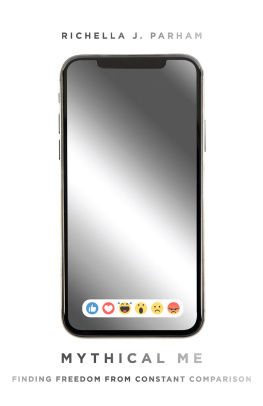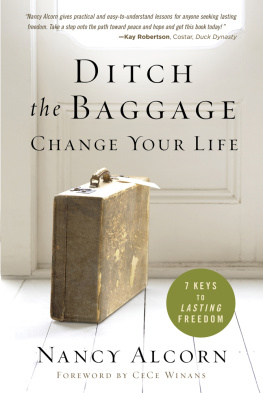Sommaire
Pagination de l'dition papier
Guide
MYTHICAL ME
FINDING FREEDOM FROM CONSTANT COMPARISON
RICHELLA J. PARHAM
InterVarsity Press
P.O. Box 1400, Downers Grove, IL 60515-1426
ivpress.com
2019 by Richella Jo Parham
All rights reserved. No part of this book may be reproduced in any form without written permission from InterVarsity Press.
InterVarsity Pressis the book-publishing division of InterVarsity Christian Fellowship/USA, a movement of students and faculty active on campus at hundreds of universities, colleges, and schools of nursing in the United States of America, and a member movement of the International Fellowship of Evangelical Students. For information about local and regional activities, visit intervarsity.org.
All Scripture quotations, unless otherwise indicated, are taken from The Holy Bible, New International Version, NIV. Copyright 1973, 1978, 1984, 2011 by Biblica, Inc.Used by permission of Zondervan. All rights reserved worldwide. www.zondervan.com. The NIV and New International Version are trademarks registered in the United States Patent and Trademark Office by Biblica, Inc.
While any stories in this book are true, some names and identifying information may have been changed to protect the privacy of individuals.
Cover design and image composite: David Fassett
Interior design: Daniel van Loon
Images: smiley faces Anna_leni / iStock / Getty Images Plus
smartphone Issarawat Tattong / Moment Collection / Getty Images
ISBN 978-0-8308-6466-9 (digital)
ISBN 978-0-8308-4395-4 (print)
This digital document has been produced by Nord Compo.
TO JACK, WILL, PRESTON, AND LEE
with so much love
If thou indeed derive thy light from Heaven,
Then, to the measure of that heaven-born light,
Shine, Poet! in thy place, and be content.
WILLIAM WORDSWORTH
THE PROBLEM
DISTORTED VISION
CHAPTER ONE
THE MYTHICAL
COMPOSITE WOMAN
How much time he gains who does not look to see
what his neighbor says or does or thinks, but only at
what he does himself, to make it just and holy.
MARCUS AURELIUS
I now consider that January day as one of the most important of my life, but I didnt know it at the time.
The day started with an ordinary carpool.
My husband and I had been married fifteen years. With our three sons, we had just moved to a beautiful new neighborhood. Several friends from church lived around the block from us, and they kindly invited me to ride with them to a community Bible study at a church across town. Grateful to be included, I hopped into my friends van.
That evening I told my husband about the Bible study and about that ride across town. Sprinkled through my description of the study of Genesis were comments like these:
Belinda is so kind and friendly. I wish I had her sense of humor.
I wish I could be more like Ann. Shes incredibly organized.
Boy, it would be nice to be like Shannashes so poised and beautiful! I wish I had her posture and carriage.
Finally, my husband interrupted me. Richella, you compare yourself with everyone you meet. You pick out the best attributes of each person and measure how you stack up against them.
His words rankled, even as I realized that he might be right.
The time spent with my three friends had given me the opportunity to observe some of their strengths, which I quickly turned into the chance to see that I was weaker in those areas. That carpool had become an occasion for me to see that I wasnt as friendly, as organized, as poised, or as pretty as I wished.
But what my husband said next really stung.
Youve created for yourself a mythical composite woman, and you think she is the standard you should meet. But that woman doesnt exist.
A mythical composite woman? What on earth was he talking about?
When I pressed him for more information, he explained that what Id done that day with my three friends was typical for me. He told me I was constantly observing people around me, always noticing their outstanding attributes.
Well, of course, I notice their outstanding attributes. I have a great appreciation for people, I defended myself.
But then you pick out each ones greatest traits and assume that you should share those. You want this persons kindness, that persons poise, this ones intelligence, that ones sensitivity. And you do it with body parts too: you admire this womans face, that womans waistline, that womans legs. You determine each persons strength and measure yourself against that strength, so you always come up short.
Youre comparing yourself to this composite woman, and Im telling you that she doesnt exist. Youre holding yourself to an impossible standard. No one could be as perfect as your mythical composite woman.
I hated to admit it, but he was right.
Having lived with me for fifteen years, Jack had picked up on a pattern I had never discerned. An avid observer of people, I always noticed the best in the folks around mehandsome features, shining talents, strengths of character. I didnt see that I compared myself to the greatest attributes of those around me.
That day started with a carpool; it ended with a lot of soul-searching.
THE ROAD TO CONSTANT COMPARISON
My inclination to compare myself to others didnt develop overnight. Although I had never noticed it in myself, my husband had observed my tendency toward comparison long before he pointed it out to me. Only after I realized the truth of his words did I admit that I had a habit of comparison, but I had no clue what to do about it.
Besides, I had a busy life to live: work to do, three small children to care for. I continued to struggle along, hyperaware of my friends strengths but mostly unaware of my own. Although I lived a full and active life, doubt and discontent plagued me. Friends and mentors would encourage me to relax, not to worry so much, to have more confidence. One teacher even inscribed this note in the front of a gift Bible: God has great plans for you. May God bless you as you develop and grow in your walk with him. Meanwhile, dont be so hard on yourself.
But being hard on myself seemed like the only logical response to all the ways I could see that I didnt measure up. I began to wonder if perhaps others should be harder on themselves. (No doubt I was a joy to live and work with.)
Eventually, in a time of deep personal and relational difficulty, I realized I needed professional help. I sought the services of a therapist who helped me to investigate my actions and motives more thoroughly than I could do alone.
Not surprisingly, the roots of my issue lay in my childhood. While that may sound trite, it was true in my case. I was born with Klippel-Trenaunay Syndrome, an extremely rare disorder that affects several body systems. Klippel-Trenaunay Syndrome is characterized by a red birthmark called a port-wine stain, overgrowth of soft tissues and bones, and various malformations of veins. The condition is so rare that my parents could never learn exactly what was wrong with me. They took me to specialists who ran all kinds of tests, but no one could diagnose my condition. Physicians now know that this syndrome is caused by a mutation in the PIK3CA gene, but when I was born, next to nothing was known about it. Only after I was an adult, when I had a child of my own, did I learn the name of the disorder.












